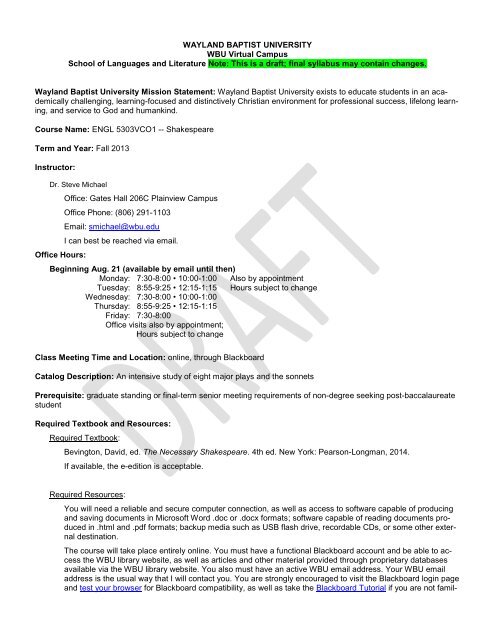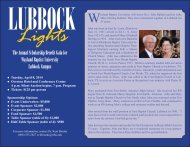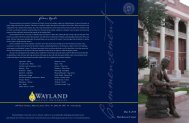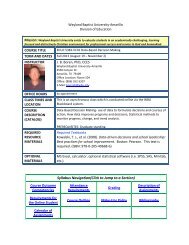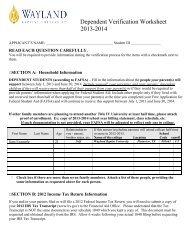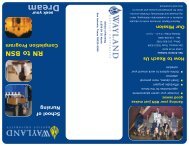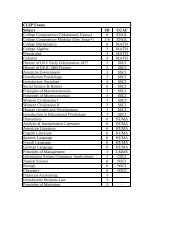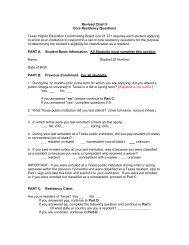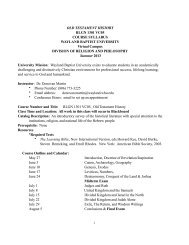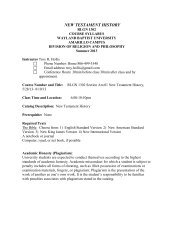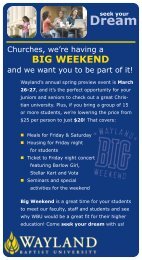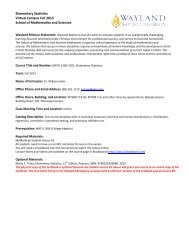Shakespeare - Wayland Baptist University
Shakespeare - Wayland Baptist University
Shakespeare - Wayland Baptist University
You also want an ePaper? Increase the reach of your titles
YUMPU automatically turns print PDFs into web optimized ePapers that Google loves.
WAYLAND BAPTIST UNIVERSITY<br />
WBU Virtual Campus<br />
School of Languages and Literature Note: This is a draft; final syllabus may contain changes.<br />
<strong>Wayland</strong> <strong>Baptist</strong> <strong>University</strong> Mission Statement: <strong>Wayland</strong> <strong>Baptist</strong> <strong>University</strong> exists to educate students in an academically<br />
challenging, learning-focused and distinctively Christian environment for professional success, lifelong learning,<br />
and service to God and humankind.<br />
Course Name: ENGL 5303VCO1 -- <strong>Shakespeare</strong><br />
Term and Year: Fall 2013<br />
Instructor:<br />
Dr. Steve Michael<br />
Office Hours:<br />
Office: Gates Hall 206C Plainview Campus<br />
Office Phone: (806) 291-1103<br />
Email: smichael@wbu.edu<br />
I can best be reached via email.<br />
Beginning Aug. 21 (available by email until then)<br />
Monday: 7:30-8:00 • 10:00-1:00 Also by appointment<br />
Tuesday: 8:55-9:25 • 12:15-1:15 Hours subject to change<br />
Wednesday: 7:30-8:00 • 10:00-1:00<br />
Thursday: 8:55-9:25 • 12:15-1:15<br />
Friday: 7:30-8:00<br />
Office visits also by appointment;<br />
Hours subject to change<br />
Class Meeting Time and Location: online, through Blackboard<br />
Catalog Description: An intensive study of eight major plays and the sonnets<br />
Prerequisite: graduate standing or final-term senior meeting requirements of non-degree seeking post-baccalaureate<br />
student<br />
Required Textbook and Resources:<br />
Required Textbook:<br />
Bevington, David, ed. The Necessary <strong>Shakespeare</strong>. 4th ed. New York: Pearson-Longman, 2014.<br />
If available, the e-edition is acceptable.<br />
Required Resources:<br />
You will need a reliable and secure computer connection, as well as access to software capable of producing<br />
and saving documents in Microsoft Word .doc or .docx formats; software capable of reading documents produced<br />
in .html and .pdf formats; backup media such as USB flash drive, recordable CDs, or some other external<br />
destination.<br />
The course will take place entirely online. You must have a functional Blackboard account and be able to access<br />
the WBU library website, as well as articles and other material provided through proprietary databases<br />
available via the WBU library website. You also must have an active WBU email address. Your WBU email<br />
address is the usual way that I will contact you. You are strongly encouraged to visit the Blackboard login page<br />
and test your browser for Blackboard compatibility, as well as take the Blackboard Tutorial if you are not famil-
iar with how the service works. If you have problems with Blackboard or your WBU email, please use the WBU<br />
Support Contacts available on the Blackboard login page.<br />
Course Outcome Competencies: Upon the conclusion of this course, students actively engaged in learning<br />
will be able to (1) read and interpret the dramas intelligently and evaluate them critically; (2) explain the basics<br />
of the cultural and historical context in which the dramas were written; (3) perceive (beyond the plot) themes<br />
and dramatic devices that make <strong>Shakespeare</strong> <strong>Shakespeare</strong>; (4) produce in style and content essays and/or<br />
oral presentations appropriate for graduate students of English; and (5) conduct research on a topic related to<br />
<strong>Shakespeare</strong>’s dramas, articulate and support a thesis, and follow through with appropriate documentation.<br />
The more the student puts into the course, the higher his or her outcome competencies will be.<br />
Attendance Requirements / Decorum and Makeup Policies: Students are expected to participate in the class and<br />
demonstrate regular attendance. This applies without exception. Participation and attendance will be determined<br />
through message board discussions, quizzes, and other activities. When a student shows a lack of participation considered<br />
by the instructor to be excessive, the instructor will so advise the student. Any student who misses 25 percent<br />
or more of the class assignments will receive a grade of F in the course. Students are required to have computer and<br />
Internet access for the course. Additional participation policies for each course, as defined by the instructor in the<br />
course syllabus, are considered a part of the <strong>University</strong>’s attendance policy. Makeup work will be offered at the instructor's<br />
discretion and will be considered on a case-by-case basis. Any authorized makeups must be completed within the<br />
time limit set by the instructor; otherwise, the makeup grade will be zero.<br />
Disability Statement: In compliance with the Americans with Disabilities Act of 1990 (ADA), it is the policy of <strong>Wayland</strong><br />
<strong>Baptist</strong> <strong>University</strong> that no otherwise qualified person with a disability be excluded from participation in, be denied the<br />
benefits of, or be subject to discrimination under any educational program or activity in the university. The Coordinator<br />
of Counseling Services serves as the coordinator of students with a disability and should be contacted concerning accommodation<br />
requests at (806) 291-3765. Documentation of a disability must accompany any request for accommodations.<br />
COURSE REQUIREMENTS and GRADING CRITERIA:<br />
Outcome competencies will be assessed in the following ways: reading quizzes, Blackboard discussion forum participation,<br />
a comparison paper, an annotated bibliography, a midterm examination, a research paper, and a final examination.<br />
Comparison Paper<br />
For this assignment, you will need to choose two of the following tragedies: Hamlet, King Lear, and Macbeth.<br />
Examine some concern that two of the plays have in common. In an essay of 3-5 typewritten, doublespaced<br />
pages, show your reader how both plays deal with this concern. Let your essay be guided by a single<br />
controlling idea, something that you want to teach your audience regarding the two plays' common concern.<br />
What can you point out that a casual reader might not immediately notice or understand? Possible topics include<br />
the following:<br />
<br />
<br />
<br />
a comparison of powerful women characters, e.g., Gertrude vs. Lady Macbeth or Goneril<br />
a comparison of how tragedy functions in two of the plays<br />
a study of ambition and its consequences in two of the plays<br />
The essay will be evaluated according to the following criteria: (1) control and responsible development of<br />
discussion; (2) presentation of ideas and wording as evidence; (3) analysis of, and ability to draw conclusions<br />
from, this evidence; (4) clarity and polish of writing; (5) proper use of MLA documentation style.<br />
Be sure to offer paraphrased and quoted evidence from the plays to substantiate your findings. Do not<br />
use outside sources; I want to see how well you understand what's going on in the two plays themselves.<br />
The essay must be typed or produced on a computer printer. Use MLA documentation style. Good MLA internet<br />
sites include:<br />
http://owl.english.purdue.edu/owl/resource/747/01/<br />
http://www.library.cornell.edu/resrch/citmanage/mla<br />
Students are at all times responsible for their materials and are required to keep copies of their work in<br />
progress. See the paragraph on "Late Work and Incompletes" below. Please email me if you would like to discuss<br />
this project.
Annotated Bibliography<br />
Find at least 6 (six) library sources on your assigned reading (see the "Research Paper" assignment for<br />
source requirements). For each source, write a bibliographic entry using MLA documentation style. Each entry<br />
should be followed by a 3-5 sentence summary of the source. The entirety should be arranged alphabetically<br />
by authors' last names. The bibliography should be preceded by a brief introduction (1-2 pages) that synthesizes<br />
the ideas in the library sources and explains your rationale for selecting the sources. I will provide a<br />
sample bibliography and introduction on request. Please email me if you would like to discuss this project.<br />
Research Paper Assignment<br />
Choose one of the works we have studied this semester. Then, write an essay that examines some interpretive<br />
problem in the work and, by using close reading and research, argue for your resolution of the problem.<br />
This is an argumentative paper. "Argumentative" does not necessarily mean that you are disagreeing with<br />
someone. It means that you are attempting to show that you are right about something that has not already<br />
been established as a fact. You want to convince your audience that something is true by using reason and<br />
evidence. A "problem" may include why a character does or doesn't do something, an odd or interesting trend<br />
in a plot, and so on. The Research Paper must meet the following requirements:<br />
<br />
<br />
Length -- 6 to 8 double-spaced typed pages (about 2400 to 3200 words)<br />
Source Requirements -- You must use at least 6 secondary sources. "Secondary" means<br />
sources that somehow comment on or clarify the issue you are discussing. These sources must<br />
come from somewhere other than your textbooks. The work you are writing about does not count<br />
as one of the secondary sources. You must have at least two articles from academic journals.<br />
Do not use reviews or study aids as sources.<br />
<br />
<br />
Presentation of Evidence -- You must cite and analyze evidence from your sources. The object<br />
of citation is not to "throw in" evidence but to use it and comment on it when you need to support<br />
one of your own points. Be sure to analyze quoted evidence from the literary work itself, not just<br />
your secondary sources.<br />
Documentation -- You must use MLA documentation style. See the following websites for assistance:<br />
http://owl.english.purdue.edu/owl/resource/747/01/<br />
http://www.library.cornell.edu/resrch/citmanage/mla<br />
How I Will Grade -- The essay will be evaluated in light of the following criteria: (1) control and responsible<br />
development of discussion; (2) presentation of evidence from the work under discussion as<br />
well as from secondary sources (let me know that you understand how to use summary, paraphrase,<br />
and quotation properly); (3) analysis of, and ability to draw conclusions from, this evidence; (4) clarity<br />
and polish of writing; (5) proper use of MLA documentation style.<br />
Possible Topics -- The following are only suggestions. You can come up with your own topic or use<br />
one of the following as an inspiration:<br />
<br />
<br />
<br />
<br />
<br />
<br />
<br />
Hamlet: Machiavellianism in Hamlet • Is Hamlet truly mad? • Is Ophelia murdered? • Appearance<br />
vs. Reality in Hamlet<br />
Is King Lear truly more sinned against than sinning? • What is <strong>Shakespeare</strong> doing with the relationship<br />
between Edmund and Nature? • Why is Gloucester in the play?<br />
Macbeth: Is Macbeth an actual tragedy? • The progress of evil in Macbeth • Why are the three<br />
witches in the play? • Why is Banquo in the play?<br />
Sonnets: What is the real-life identity of one of the love triangle characters: the speaker, the<br />
Dark Lady, or the Fair Young Man? Pick only one.<br />
1 Henry IV: How necessary are the two plots (comic robbers and noble rebels)? • Prince Hal<br />
as a king in the making<br />
Henry V: Why does Falstaff not appear on stage? • Why does <strong>Shakespeare</strong> pay so much attention<br />
to Captain Fluellen (or Ancient Pistol)?<br />
Critics often associate Caliban in The Tempest with colonialism. What is your view of this issue?<br />
• Is Prospero symbolic of something or someone <strong>Shakespeare</strong> worried about?
A Midsummer Night's Dream: Is Theseus a good ruler? • The presentation of women in MND •<br />
A character assessment of Puck<br />
The Taming of the Shrew: Kate as "monster" • Is Petruchio trying to oppress Kate or help her?<br />
• An analysis of Kate's final speech: is she serious, or is she playing a game with Petruchio?<br />
The Research Paper must be submitted during the week stipulated in the syllabus schedule and will not be<br />
accepted after that week. Students are at all times responsible for their materials and are required to keep<br />
copies of their work in progress. Please see me if you need assistance or clarification.<br />
Quizzes: Students should expect quizzes over the reading assignments and/or class topics as often as every day.<br />
The format of the quizzes usually will be questions that invite brief written interpretive/critical responses. Quizzes<br />
will have expiration dates and times, after which they will no longer be available. I will not offer early or make-up<br />
quizzes. I will, however, drop your two lowest quiz grades. Quizzes will be evaluated for organization and focus,<br />
use of evidence in the form of paraphrased or summarized scenes or exchanges, and writing that is clear and free<br />
of errors.<br />
Blackboard Participation<br />
Each week, I will present at least one topic for discussion on the Blackboard forum for this course. You are expected<br />
to participate helpfully and meaningfully in each discussion. You may be asked to read outside articles in<br />
preparation for these discussions. Please be sure that you can access the proprietary databases, such as JSTOR,<br />
in the "Articles & Databases" area of the WBU library website in order to view these articles.<br />
Exams: There will be two exams -- Exam 1 and the Final Exam. Both exams will be in essay-question form and<br />
will be evaluated according to the following criteria: (1) how well you know the content of the reading assignments,<br />
lectures, discussions, and any pertinent supplementary material; and (2) how well you organize, develop, and express<br />
your thoughts. The first exam may be made up only at the instructor's discretion. Students should be prepared<br />
to explain why they missed this exam. The final exam will be comprehensive, and there will be no makeup<br />
for it. Students are expected to arrange well in advance to take the final exam during the week stipulated in the syllabus<br />
schedule. I cannot offer an alternate date or time.<br />
Grading / Help: (See Grade Distribution table below.) My grading scale is as follows: 90-92/A-, 93-97/A, 98-100/A+;<br />
80-82/B-, 83-87/B, 88-89/B+, and so forth. Anything below 60 is an F. Weighted grades are averaged according to a<br />
100-point scale and are totaled at the end of the semester. If your total is 79.44, your course grade is a C. If your total<br />
is 79.45, your course grade is a B. I am always pleased to talk with you about your progress in the course, any difficulties<br />
or victories, or any thoughts you may have about literature and life in general.<br />
Grade Distribution (how much grades count):<br />
Assignment % of Course Grade Assignment % of Course Grade<br />
Quiz Average 5% Annotated Bibliography 15%<br />
Blackboard Participation 5% Research Paper 25%<br />
Comparison Paper 10% Final Exam 25%<br />
Exam 1 15% Total 100%<br />
Academic Honesty: College students—especially <strong>Wayland</strong> students—are expected to exercise scrupulous honesty in<br />
their work. No form of cheating will be tolerated. Plagiarism—intentionally or unintentionally representing another writer's<br />
words or ideas as your own—is a serious violation of academic conduct and may result in an F on a written assignment.<br />
Students are responsible for familiarizing themselves immediately with university policy on academic honesty<br />
in their copies of the <strong>Wayland</strong> <strong>Baptist</strong> <strong>University</strong> Undergraduate and Graduate Catalog and the Student Handbook.<br />
Late Work and Incompletes: All work, including essays, message board responses, quizzes, exams, and other activities,<br />
will have due dates and late penalties. These due dates will be indicated in the syllabus schedule and in announcements.<br />
Failure to submit work on time will result in the reduction of your grade for that work by 10 points per 24-<br />
hour period following the due date. For example, if something is due by midnight CST (Central Standard Time) on September<br />
30, you will be counted off 10 points if I don't have your work by midnight CST on October 1. You will be count-
ed off 20 points after midnight CST on October 2. After four late periods, the work will no longer be accepted. This policy<br />
applies without exception. Make-up opportunities will be offered only in extreme circumstances and only when a<br />
student has contacted me within three days of the due date. The student must explain the reason for the deficiency,<br />
and I will determine whether the work may be made up. No make-up opportunities will be offered for quizzes, the final<br />
research essay, or the final exam. Make-up opportunities for lengthy absences (two weeks or longer) will not be offered<br />
except in extremely compelling cases. Military personnel who think they may have to be gone on extended TDY's<br />
should arrange for computer and internet access during that time. Grades of Incomplete (I) will not be considered.<br />
Please contact me early if you're having trouble getting something in so that I can assist you properly.<br />
Course Outline: This offering of ENGL 5303 will introduce students to selected plays and sonnets of William <strong>Shakespeare</strong>.<br />
We will begin by discussing the course requirements and acclimating ourselves to the social and artistic dynamics<br />
of <strong>Shakespeare</strong>'s world. Then we will examine three of his tragedies, a select number of his sonnets, two of his<br />
histories, one of his "romance" plays, and two of his comedies. The course will not attempt to follow <strong>Shakespeare</strong>'s<br />
career chronologically but will, instead, analyze his works from generic and thematic perspectives. See "Schedule for<br />
ENGL 5303" in this syllabus for details and a calendar of daily topics / readings / assignments. (NB: examples, ideas,<br />
opinions, and theories presented during class meetings do not necessarily reflect the views of the instructor. Furthermore,<br />
this syllabus is a plan. Although no significant changes are anticipated, the instructor may modify the plan during<br />
the course. The requirements of the course may be altered from those appearing in the syllabus. Finally, the plan contains<br />
criteria by which the student's progress and performance in the course will be measured. These criteria may also<br />
be changed.)
SCHEDULE FOR ENGLISH 5303<br />
Class members are responsible for keeping up with the following schedule. Please complete the reading assignments<br />
prior to the weeks indicated. For example, you should already have read King Lear before August 26, Macbeth<br />
before September 3, etc. This is a working schedule and may be altered at the instructor's discretion, although departures<br />
are unlikely. Students will be notified of any changes on Blackboard.<br />
Week 1 (beginning Aug. 19):<br />
Hamlet<br />
Introduction to <strong>Shakespeare</strong> and His Times • Introduction to <strong>Shakespeare</strong>an Tragedy •<br />
Week 2 (beginning Aug. 26):<br />
King Lear<br />
Week 3 (beginning Sep. 3):<br />
Macbeth • Sep. 4 is last day to drop or withdraw without record<br />
Week 4 (beginning Sep. 9): Selected Sonnets (students will be given a list) • Introduction to <strong>Shakespeare</strong>an History<br />
• Comparison Paper Due<br />
Week 5 (beginning Sep. 16):<br />
1 Henry IV (also called Henry IV Part I or Henry IV Part the First)<br />
Week 6 (beginning Sep. 23): Henry V • Exam 1<br />
Week 7 (beginning Sep. 30):<br />
Due<br />
Introduction to <strong>Shakespeare</strong>an Romance • The Tempest • Annotated Bibliography<br />
Week 8 (beginning Oct. 7): Introduction to <strong>Shakespeare</strong>an Comedy • Midsummer Night's Dream • Oct. 11 is last<br />
day to officially drop or withdraw with "W"<br />
Week 9 (beginning Oct. 14):<br />
"WP/WF"<br />
The Taming of the Shrew • Oct. 18 is last day to officially drop or withdraw with grade of<br />
Week 10 (beginning Oct. 21):<br />
Tying Up Loose Ends • Course Retrospective • Research Paper Due<br />
Week 11 (beginning Oct. 28):<br />
Final Exam
Suggested Research Tools and Reading<br />
General Bibliographies<br />
<br />
<br />
<br />
<br />
<br />
<br />
<br />
MLA International Bibliography (available online via<br />
the WBU library website; a fast way to find<br />
worthwhile scholarly studies; supplement with<br />
ABELL)<br />
ABELL (available online via the WBU library<br />
website; a fast way to find worthwhile scholarly<br />
studies; supplement with MLA International<br />
Bibliography)<br />
The Year's Work in English Studies (available online<br />
via the WBU library website; a valuable annual<br />
review of criticism; summarizes important scholarly<br />
studies on an author and/or work and helps you to<br />
see context of recent debates and topics of interest)<br />
Essay and General Literature Index (available<br />
online via the WBU library website; excellent source<br />
for studies included in edited collections; useful for<br />
supplementing all of the above)<br />
Magill's Bibliography of Literary Criticism (okay for<br />
finding older journal articles and essays in edited<br />
collections, but use other bibliographies first; in<br />
volume form in Mabee LRC reference room)<br />
The Mabee LRC reference room has an excellent<br />
collection of checklists and annotated bibliographies<br />
on individual authors and literary topics; can also<br />
find bibliographies upstairs with other books by and<br />
about the authors<br />
The best Web site for English literature on the Internet<br />
is Literary Resources on the Net, located at the<br />
following URL:<br />
http://andromeda.rutgers.edu/~jlynch/Lit/<br />
ren.html<br />
Follow the Renaissance link and search "William<br />
<strong>Shakespeare</strong>"<br />
<strong>Shakespeare</strong> Resources<br />
<br />
<br />
<br />
<br />
<br />
<strong>Shakespeare</strong>: An Annotated World Bibliography,<br />
published annually in the journal <strong>Shakespeare</strong><br />
Quarterly<br />
Wells, ed., "The Year's Contribution to <strong>Shakespeare</strong>an<br />
Study" in <strong>Shakespeare</strong> Survey (1950-1988)<br />
Bevington, <strong>Shakespeare</strong><br />
Champion, The Essential <strong>Shakespeare</strong>: An Annotated<br />
Bibliography of Modern Major Studies<br />
Good <strong>Shakespeare</strong> Internet site:<br />
Suggested Reading<br />
http://shakespeare.palomar.edu/<br />
Biography<br />
Park, Honan, <strong>Shakespeare</strong>: A Life (1998)<br />
Reese, M. M., <strong>Shakespeare</strong>: His World and His<br />
Work (1980)<br />
Rowse, A. L., William <strong>Shakespeare</strong>: A Biography<br />
(1963)<br />
Schoenbaum, S., William <strong>Shakespeare</strong>: A Documentary<br />
Life (1975)<br />
Tragedies<br />
Dillon, Janette, The Cambridge introduction to<br />
<strong>Shakespeare</strong>'s Tragedies (2007)<br />
Heilman, Robert Bechtold, <strong>Shakespeare</strong>, The Tragedies:<br />
New Perspectives (1984)<br />
Leech, Clifford, <strong>Shakespeare</strong>: The Tragedies: A<br />
Collection of Critical Essays (1965)<br />
McEachern, Claire Elizabeth, The Cambridge Companion<br />
to <strong>Shakespeare</strong>an Tragedy (2002)<br />
Histories<br />
Campbell, Lily Bess, <strong>Shakespeare</strong>'s "Histories": Mirrors<br />
of Elizabethan Policy (1978)<br />
Waith, Eugene M., <strong>Shakespeare</strong>: The Histories: A<br />
Collection of Critical Essays (1965)<br />
Wilders, John, The Lost Garden: A View of <strong>Shakespeare</strong>'s<br />
English and Roman History Plays (1978)<br />
Sonnets<br />
Booth, Stephen, An Essay on <strong>Shakespeare</strong>'s Sonnets<br />
(1969)<br />
Callaghan, Dympna, <strong>Shakespeare</strong>'s Sonnets (2007)<br />
Muir, Kenneth, <strong>Shakespeare</strong>'s Sonnets (1979)<br />
Schoenfeldt, Michael Carl, A Companion to <strong>Shakespeare</strong>'s<br />
Sonnets (2007)<br />
Romances (The Tempest)<br />
Knowles, James, <strong>Shakespeare</strong>'s Late Plays:<br />
New Readings (1999)<br />
Coursen, Herbert R., The Tempest: A Guide to<br />
the Play (2000)<br />
Smith, Hallett Darius, Twentieth Century Interpretations<br />
of The Tempest: A Collection of Critical<br />
Essays (1969)<br />
Comedies<br />
Charney, Maurice, <strong>Shakespeare</strong>an Comedy (1980)<br />
Gay, Penny, As She Likes It: <strong>Shakespeare</strong>'s Unruly<br />
Women (2002)<br />
Leggatt, Alexander, The Cambridge Companion to<br />
<strong>Shakespeare</strong>an Comedy (2002)<br />
General Interest<br />
Bevington, David M. How to Read a <strong>Shakespeare</strong><br />
Play (2006)<br />
Kermode, Frank, The Age of <strong>Shakespeare</strong> (2004)<br />
Korda, Natasha, <strong>Shakespeare</strong>'s Domestic Economies:<br />
Gender and Property in Early Modern England<br />
(2002)<br />
Rackin, Phyllis, <strong>Shakespeare</strong> and Women (2005)<br />
Taylor, Michael, <strong>Shakespeare</strong> Criticism in the Twentieth<br />
Century (2001)<br />
Note: Our library subscribes to the excellent and authoritative<br />
journal <strong>Shakespeare</strong> Quarterly. Please take advantage of<br />
this resource.


